1. 6v6 Season
1.1. Tier System
All teams will be split into different tiers according to their skill level, past season results and stability. In the Premiership and Division tiers teams will be distributed into groups of eight teams where each will play against the others in a Round Robin format. In the remaining tiers, every team will play weekly fixtures against similarly skilled opponents in a Swiss-Style System. All of these matches will be played during the competition’s regular season, which will last seven weeks.
Two maps are played per official match during the regular season. League points are awarded based on the final result of each map:
- Regular wins award 3 points
- Regular losses award 0 points
- “Golden Cap” wins award 2 point
- “Golden Cap” losses award 1 point
A “Golden Cap” is defined as a decider round played on a map to determine its winner. Decider rounds are defined on a per-gamemode basis.
League points are awarded purely by the final result of a map. Aside from the necessity of “Golden Cap” rounds, the number of captures has no effect on league points themselves. Captures only determine which team wins a map.
1.2. Playoffs and Tiebreakers
The playoffs stage will be held after the regular season ends. Its schedule can be found on the competition’s [homepage].
For playoffs official matches, maps will be chosen by the participating teams using the Picks/Bans Map Elimination System, with seeding coming from their relative placement in the regular season. [Explanation]
Teams tied for any playoffs spots in their respective tier will be ordered using the following methods, ordered by priority:
- Head-to-Head (if applicable)
- Sonneborn-Berger Score
- Total Rounds scored
If the first method does not split the teams, the second method will be used. If the second method does not split the teams, the third method will be used.
The Neustadtl Sonneborn-Berger Score is calculated as follows:
- For each match, calculate the ratio of points the team earned compared to the maximum, and multiply this by the opponent’s total score in the competition. Use only scores and opponents from “valid” matches (matches that were not default wins and were not against dropped opponents).
- Calculate the sum of all scores calculated via the above method.
- Divide the sum by the number of “valid” matches played.
1.3. Mercenary clause
Definition: Mercenaries or “Mercs” or “ringers” are defined as players who are not part of a team’s roster. Players who are listed as “unverified” on a roster also count as mercs if they were listed as such at the time an official was set to start.
Standard: A team can use up to a maximum of 2 mercs (including default merc) per map and simultaneously, even if the opponent would allow the use of more than 2 mercs. A team can only use 1 default merc as per rule [1.3.2 Default Mercs]. Otherwise, no team may use a merc at any time during a match unless the player(s) is/are granted explicit written permission to play by the opposing team.
Process: Merc permission grants are player-based and class-based: teams are free to choose whether a player is allowed to play for their opponents as a merc and which classes they are allowed to play. Classes deemed as “off-classes” (i.e. Pyro, Heavy, Engineer, Sniper and Spy) are allowed by default. If no specific classes are stated, a player allowed to play as a merc can play any class of their choice.
All agreements for merc permission grants and the usage of default mercs must be logged and provided in the official match’s respective comments. Those logs must explicitly contain links to each approved merc’s ETF2L profile. Teams are advised to check if the proposed default merc is indeed eligible as per rule [1.3.2 Default Mercs]. All mercs have to be registered on ETF2L.
The team that requested the merc is responsible for making sure that this permission is granted. If a team wants to use any players who are not eligible to be a default merc, they must contact the opponent before the match starts.
Breaking the rules: Failing to present a default merc to the opposing team will grant you a minor warning. A team using an unapproved merc or an unregistered player will receive a minor warning and Default Loss.
1.3.1. “Permanent mercenary” are not tolerated
A player can only be used as a merc up to 3 times for one and the same team during the entire competition (regardless of the player being an approved merc). If a player has already played as a merc 3 times for a team, they are not allowed to join the team in question. After the fourth match as a merc for the same team, the player is considered a permanent merc and the team may be punished.
All cases of players being caught or reported as permanent merc are reviewed individually, with any decisions being made at the full discretion of the admin team. All circumstances will be taken into account.
Note: In accordance with [General Rule 2.3], two team changes per competition are tolerated.
1.3.2. Default mercenary
One merc is allowed by default in all divisions:
-
For Premiership, default mercs cannot be rostered in a Premiership team and/or have Premiership experience. Default mercs cannot be class-restricted. RGL Invite is considered to be equivalent to Premiership.
-
For D1/High, D2/High, D3/Mid and D4/Mid default mercs cannot be rostered in a team and/or have experience in the tier that the match is being played in, or any other tier above that. Default mercs cannot be class-restricted. Experience in other leagues is also included. (e.g. A high team will only be able to present a default merc from mid.)
-
For D5/Low and D6/Open specifically they cannot be more experienced than the tier the match is being played in, and they cannot be rostered in a team placed in any tier higher than that of the official match in question. Default mercs cannot be class-restricted. Experience in other leagues is also included.
If you wish to contest the default status of a merc, please contact a League Admin on [ETF2L’s Discord server] so they may decide whether or not the player is valid for the Default merc clause.
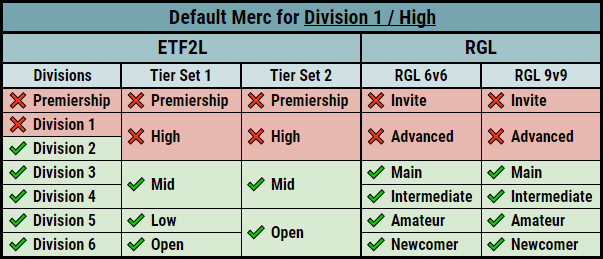
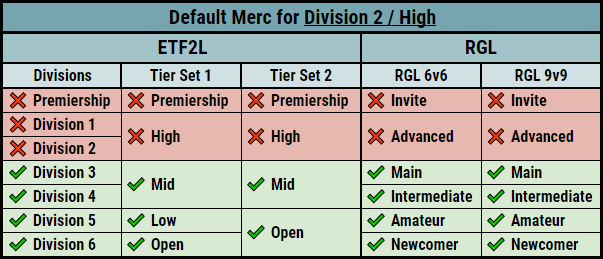
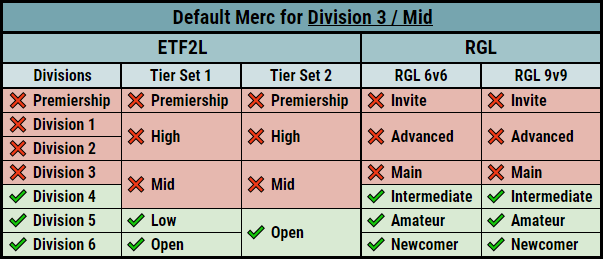
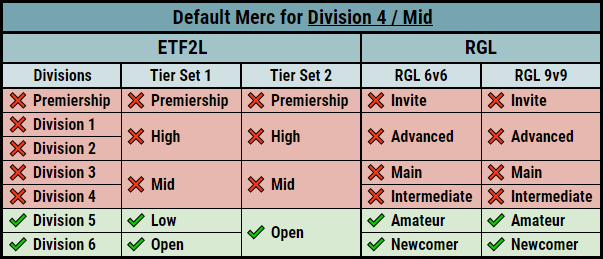
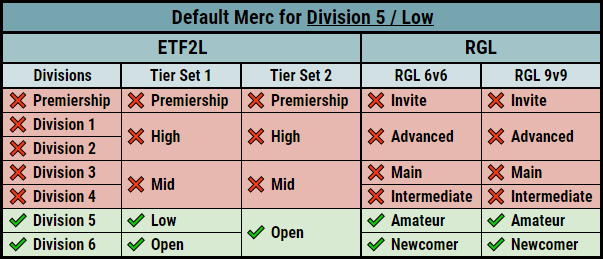
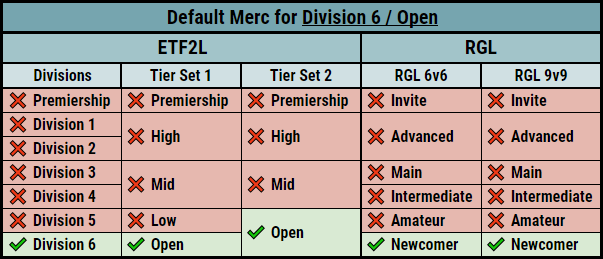
1.4. Teams with three Default Losses or two Default Losses in a row will be expelled from the season
If a team receives a third Default Loss during the competition, or two Default Losses in a row, they will be expelled from the league for the running season.